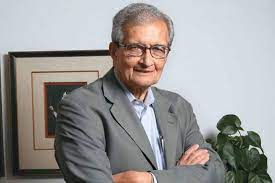Amartya Sen, a distinguished economist, philosopher, and Nobel laureate, has dedicated his life to advancing the cause of social justice and welfare. Through his groundbreaking research, insightful writings, and tireless advocacy, Sen has emerged as one of the most influential voices in the fields of economics, ethics, and development studies. In this exploration, we delve into the remarkable journey of Amartya Sen, a visionary thinker whose ideas have shaped public policy and inspired generations around the world.
Born on November 3, 1933, in Santiniketan, West Bengal, India, Sen’s early years were shaped by his upbringing in a family deeply committed to education and social reform. Influenced by the teachings of Rabindranath Tagore and his experiences growing up in an intellectually vibrant environment, Sen developed a keen interest in understanding the complexities of human society and the challenges of inequality and poverty.
Sen’s academic journey took him to some of the most prestigious institutions around the world, including Trinity College, Cambridge, where he studied economics under the guidance of renowned scholars such as Joan Robinson and Nicholas Kaldor. It was during his time at Cambridge that Sen began to develop his seminal contributions to the field of welfare economics and social choice theory.
One of Sen’s most influential contributions is his work on the capability approach, which emphasizes the importance of focusing on people’s capabilities and freedoms rather than merely their material resources. According to Sen, true development should be measured not just in terms of income or GDP growth but also in terms of the ability of individuals to lead lives that they have reason to value. This groundbreaking approach has had a profound impact on the way policymakers and development practitioners conceptualize and evaluate progress in human development.
In addition to his academic work, Sen has been a vocal advocate for social justice and human rights. He has spoken out against inequality, discrimination, and injustice in all its forms, using his platform to raise awareness and promote change. Through his writings and public lectures, Sen has inspired people around the world to strive for a more equitable and just society.
Sen’s contributions to the field of economics and social science have been widely recognized and celebrated. In 1998, he was awarded the Nobel Prize in Economic Sciences for his work on welfare economics and social choice theory. Throughout his career, Sen has received numerous other honors and awards, including the Bharat Ratna, India’s highest civilian award, in recognition of his outstanding contributions to humanity.
As Sen continues to engage in research, writing, and advocacy, his legacy remains a testament to the power of ideas to shape the world. Through his unwavering commitment to social justice and welfare, he has inspired generations of scholars, policymakers, and activists to work towards a more inclusive and equitable society.
In conclusion, Amartya Sen’s life and work exemplify the transformative potential of scholarship and activism in advancing the cause of social justice and welfare. Through his pioneering research, insightful writings, and passionate advocacy, Sen has left an indelible mark on the world, inspiring countless individuals to strive for a better future for all. As his ideas continue to resonate, Sen’s legacy will endure as a beacon of hope and inspiration for generations to come.






